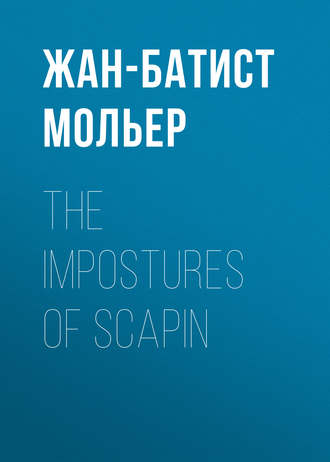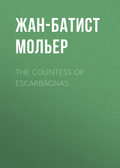
Мольер (Жан-Батист Поклен)
The Impostures of Scapin
SCENE VIII. – ARGANTE, SCAPIN
SCA. (aside). Here he is, turning it over in his mind.
ARG. (thinking himself alone). Such behaviour and such lack of consideration! To entangle himself in an engagement like that! Ah! rash youth.
SCA. Your servant, Sir.
ARG. Good morning, Scapin.
SCA. You are thinking of your son's conduct.
ARG. Yes, I acknowledge that it grieves me deeply.
SCA. Ah! Sir, life is full of troubles; and we should always be prepared for them. I was told, a long time ago, the saying of an ancient philosopher which I have never forgotten.
ARG. What was it?
SCA. That if the father of a family has been away from home for ever so short a time, he ought to dwell upon all the sad news that may greet him on his return. He ought to fancy his house burnt down, his money stolen, his wife dead, his son married, his daughter ruined; and be very thankful for whatever falls short of all this. In my small way of philosophy, I have ever taken this lesson to heart; and I never come home but I expect to have to bear with the anger of my masters, their scoldings, insults, kicks, blows, and horse-whipping. And I always thank my destiny for whatever I do not receive.
ARG. That's all very well; but this rash marriage is more than I can put up with, and it forces me to break off the match I had intended for my son. I have come from my solicitor's to see if we can cancel it.
SCA. Well, Sir, if you will take my advice, you will look to some other way of settling this business. You know what a law-suit means in this country, and you'll find yourself in the midst of a strange bush of thorns.
ARG. I am fully aware that you are quite right; but what else can I do?
SCA. I think I have found something that will answer much better. The sorrow that I felt for you made me rummage in my head to find some means of getting you out of trouble; for I cannot bear to see kind fathers a prey to grief without feeling sad about it, and, besides, I have at all times had the greatest regard for you.
ARG. I am much obliged to you.
SCA. Then you must know that I went to the brother of the young girl whom your son has married. He is one of those fire-eaters, one of those men all sword-thrusts, who speak of nothing but fighting, and who think no more of killing a man than of swallowing a glass of wine. I got him to speak of this marriage; I showed him how easy it would be to have it broken off, because of the violence used towards your son. I spoke to him of your prerogatives as father, and of the weight which your rights, your money, and your friends would have with justice. I managed him so that at last he lent a ready ear to the propositions I made to him of arranging the matter amicably for a sum of money. In short, he will give his consent to the marriage being cancelled, provided you pay him well.
ARG. And how much did he ask?
SCA. Oh! at first things utterly out of the question.
ARG. But what?
SCA. Things utterly extravagant.
ARG. But what?
SCA. He spoke of no less than five or six hundred pistoles.
ARG. Five or six hundred agues to choke him withal. Does he think me a fool?
SCA. Just what I told him. I laughed his proposal to scorn, and made him understand that you were not a man to be duped in that fashion, and of whom anyone can ask five or six hundred pistoles! However, after much talking, this is what we decided upon. "The time is now come," he said, "when I must go and rejoin the army. I am buying my equipments, and the want of money I am in forces me to listen to what you propose. I must have a horse, and I cannot obtain one at all fit for the service under sixty pistoles."
ARG. Well, yes; I am willing to give sixty pistoles.
SCA. He must have the harness and pistols, and that will cost very nearly twenty pistoles more.
ARG. Twenty and sixty make eighty.
SCA. Exactly.
ARG. It's a great deal; still, I consent to that.
SCA. He must also have a horse for his servant, which, we may expect, will cost at least thirty pistoles.
ARG. How, the deuce! Let him go to Jericho. He shall have nothing at all.
SCA. Sir!
ARG. No; he's an insolent fellow.
SCA. Would you have his servant walk?
ARG. Let him get along as he pleases, and the master too.
SCA. Now, Sir, really don't go and hesitate for so little. Don't have recourse to law, I beg of you, but rather give all that is asked of you, and save yourself from the clutches of justice.
ARG. Well, well! I will bring myself to give these thirty pistoles also.
SCA. "I must also have," he said, "a mule to carry…"
ARG. Let him go to the devil with his mule! This is asking too much. We will go before the judges.
SCA. I beg of you, Sir!
ARG. No, I will not give in.
SCA. Sir, only one small mule.
ARG. No; not even an ass.
SCA. Consider…
ARG. No, I tell you; I prefer going to law.
SCA. Ah! Sir, what are you talking about, and what a resolution you are going to take. Just cast a glance on the ins and outs of justice, look at the number of appeals, of stages of jurisdiction; how many embarrassing procedures; how many ravening wolves through whose claws you will have to pass; serjeants, solicitors, counsel, registrars, substitutes, recorders, judges and their clerks. There is not one of these who, for the merest trifle, couldn't knock over the best case in the world. A serjeant will issue false writs without your knowing anything of it. Your solicitor will act in concert with your adversary, and sell you for ready money. Your counsel, bribed in the same way, will be nowhere to be found when your case comes on, or else will bring forward arguments which are the merest shooting in the air, and will never come to the point. The registrar will issue writs and decrees against you for contumacy. The recorder's clerk will make away with some of your papers, or the instructing officer himself will not say what he has seen, and when, by dint of the wariest possible precautions, you have escaped all these traps, you will be amazed that your judges have been set against you either by bigots or by the women they love. Ah! Sir, save yourself from such a hell, if you can. 'Tis damnation in this world to have to go to law; and the mere thought of a lawsuit is quite enough to drive me to the other end of the world.
ARG. How much does he want for the mule?
SCA. For the mule, for his horse and that of his servant, for the harness and pistols, and to pay a little something he owes at the hotel, he asks altogether two hundred pistoles, Sir.
ARG. Two hundred pistoles?
SCA. Yes.
ARG. (walking about angrily). No, no; we will go to law.
SCA. Recollect what you are doing.
ARG. I shall go to law.
SCA. Don't go and expose yourself to…
ARG. I will go to law.
SCA. But to go to law you need money. You must have money for the summons, you must have money for the rolls, for prosecution, attorney's introduction, solicitor's advice, evidence, and his days in court. You must have money for the consultations and pleadings of the counsel, for the right of withdrawing the briefs, and for engrossed copies of the documents. You must have money for the reports of the substitutes, for the court fees1 at the conclusion, for registrar's enrolment, drawing up of deeds, sentences, decrees, rolls, signings, and clerks' despatches; letting alone all the presents you will have to make. Give this money to the man, and there you are well out of the whole thing.
ARG. Two hundred pistoles!
SCA. Yes, and you will save by it. I have made a small calculation in my head of all that justice costs, and I find that by giving two hundred pistoles to your man you will have a large margin left – say, at least a hundred and fifty pistoles – without taking into consideration the cares, troubles, and anxieties, which you will spare yourself. For were it only to avoid being before everybody the butt of some facetious counsel, I had rather give three hundred pistoles than go to law. {Footnote: What would Molière have said if he had been living now!}
ARG. I don't care for that, and I challenge all the lawyers to say anything against me.
SCA. You will do as you please, but in your place I would avoid a lawsuit.
ARG. I will never give two hundred pistoles.
SCA. Ah! here is our man.
SCENE IX. – ARGANTE, SCAPIN, SILVESTRE,
dressed out as a bravo.
SIL. Scapin, show me that Argante who is the father of Octave.
SCA. What for, Sir?
SIL. I have just been told that he wants to go to law with me, and to have my sister's marriage annulled.
SCA. I don't know if such is his intention, but he won't consent to give the two hundred pistoles you asked; he says it's too much.
SIL. S'death! s'blood! If I can but find him, I'll make mince-meat of him, were I to be broken alive on the wheel afterwards.
(ARGANTE hides, trembling, behind SCAPIN.)
SCA. Sir, the father of Octave is a brave man, and perhaps he will not be afraid of you.
SIL. Ah! will he not? S'blood! s'death! If he were here, I would in a moment run my sword through his body. (Seeing ARGANTE.) Who is that man?
SCA. He's not the man, Sir; he's not the man.
SIL. Is he one of his friends?
SCA. No, Sir; on the contrary, he's his greatest enemy.
SIL. His greatest enemy?
SCA. Yes.
SIL. Ah! zounds! I am delighted at it. (To ARGANTE) You are an enemy of that scoundrel Argante, are you?
SCA. Yes, yes; I assure you that it is so.
SIL. (shaking ARGANTE'S hand roughly). Shake hands, shake hands. I give you my word, I swear upon my honour, by the sword I wear, by all the oaths I can take, that, before the day is over, I shall have delivered you of that rascally knave, of that scoundrel Argante. Trust me.
SCA. But, Sir, violent deeds are not allowed in this country.
SIL. I don't care, and I have nothing to lose.
SCA. He will certainly take his precautions; he has relations, friends, servants, who will take his part against you.
SIL. Blood and thunder! It is all I ask, all I ask. (Drawing his sword.) Ah! s'death! ah! s'blood! Why can I not meet him at this very moment, with all these relations and friends of his? If he would only appear before me, surrounded by a score of them! Why do they not fall upon me, arms in hand? (Standing upon his guard.) What! you villains! you dare to attack me? Now, s'death! Kill and slay! (He lunges out on all sides; as if he were fighting many people at once.) No quarter; lay on. Thrust. Firm. Again. Eye and foot. Ah! knaves! ah! rascals! ah! you shall have a taste of it. I'll give you your fill. Come on, you rabble! come on. That's what you want, you there. You shall have your fill of it, I say. Stick to it, you brutes; stick to it. Now, then, parry; now, then, you. (Turning towards ARGANTE and SCAPIN.) Parry this; parry. You draw back? Stand firm, man! S'death! What! Never flinch, I say.
SCA. Sir, we have nothing to do with it.
SIL. That will teach you to trifle with me.






